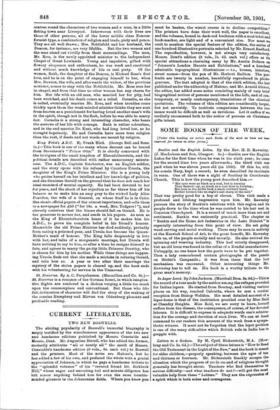SOME BOOKS OF THE WEEK.
[Under this heading we notice such Books of the week as hays not bees reserved for review in other forms.] Busk-in and the English Lakes. By the Rev. H. D. Rawnsley. (J. MacLehose and Son, Glasgow. 5s.)—Ruskin saw the English Lakes for the first time when he was in his sixth year; he came for the second time two years afterwards ; the third visit was paid when he was eleven years old (in 1830). Of this he, with his cousin Mary, kept a record; he even described its incidents in verse. One of these was a sight of Southey in Crosthwaite Church. This is how the young poet described him :— " His eyes were as black as a coal, but in turning They flashed—ay, as much as a coal does in burning ; His nose in the midst took a small outward bend, Bather hooked like an eagle's and sharp at the end."
That was pretty good for a boy of eleven. This visit made a profound and lifelong impression upon him. Mr. Rawnsley pursues the story of Ruskin's relations with this region and its people down to the time when he was carried to his last rest in Coniston Churchyard. It is a record of much more than art and sentiment. Ruskin was eminently practical. The chapter on " Ruskin and the Home Art Industries in the Lake District" is especially interesting from this point of view. He set going wood carving and metal working. These may be seen in activity at the Keswick School of Art, to the great benefit, Mr. Rawnsley tells us, of the people socially and morally. He also revived the spinning and weaving industry. This had utterly disappeared, but an old loom was found in the cellar of a Kendal manufacturer. Unhappily, no one knew how the parts were to be pat together. Then a lady remembered certain photographs of the panels on Giotto's Campanile ; it was from these that the lost mechanism was recovered. Other interesting things Mr. Rawnsley has to tell us. His book is a worthy tribute to the great man's memory.














































 Previous page
Previous page